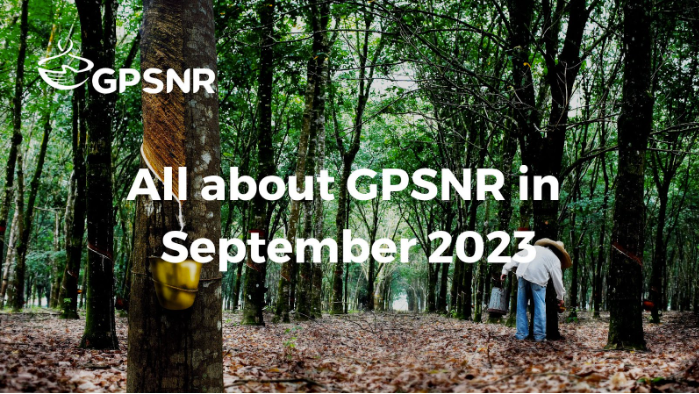
Strategy and Objectives Working Group:
The Traceability Pilot Field Trials consortiums Agridence and Koltiva have presented the final reports, which have been distributed within the Risk Subgroup.
The Risk Subgroup has extended an invitation to ASI to share the formula behind the Risk Assessment Framework. This ensures that the framework is malleable to fit the dynamics of the Natural Rubber Industry.
Furthermore, the Risk Subgroup has solidified plans for an initial pilot trial in collaboration with ASI, focusing on the establishment of Indonesia’s national risk assessment.
The resolution for the Assurance Model has been finalised and is currently in circulation among the wider membership for voting. The Member’s Journey Model and Assurance Model Timeline are slated for voting at GA 2023. The following items have been included in the Resolution as a strong basis for future consultations and discussions following GA 2023: Shared Investment Mechanism, Assurance Model Framework, and KPIs.
The Risk Subgroup is awaiting proposals from the Basel Institute in addressing corruption within Rubber Supply Chains from the ASI Risk Tool, Reporting Requirements and doing a qualitative corruption data analysis.
Furthermore, the Risk Subgroup anticipates developments in the Assurance Model in December 2023, before proceeding with the expansion of the Risk Tool and the pre-setting of national risk levels. This ensures that the Risk Tool is not developed in silo and is in alignment with the other components of the Assurance Model.
Lastly, the Risk Subgroup intends to conduct an analysis of the Risk Tool with the Policy Framework to further understand how granular should Risk Assessment reach. For example, is Risk Assessment sufficient on a theme level or would it be necessary to deep dive into the Policy Component level.
Smallholders Representation and Capacity Building (SCB) Working Group:
The Thailand Agroforestry subgroup conducted a KPI workshop before the Agroforestry training in October 2023. The subgroup is gearing up to conduct the inaugural set of Agroforestry training sessions, benefiting 100 farmers in Songkhla in October 2023.
Additionally, a productive knowledge exchange session took place involving the Agroforestry-Income Diversification task force, Pak Febrius, and the Thailand Agroforestry Subgroups.
Meanwhile, the Thailand GAP subgroup successfully finalised a contractual agreement with Koltiva and will hold its kick-off meeting, marking the first meeting since the start of the project.
The HCSA-HCVN Field Trials task force presented its final report to the SCB WG for endorsement.
The Digital Knowledge Sharing Platform (KSP) task force has conducted two pre-pilot development meetings and the Rubber Wiki app was officially launched on the Google Play Store. The task force is planning a training session tailored for task force and secretariat members, focusing on the effective management of Rubber Wiki. Following the app’s official launch, the KSP contractor will organise group socialising events in Indonesia and Thailand, aimed at introducing the app and gathering valuable user feedback.
Lastly, the SCB WG is gearing up for both national and international calls with smallholder members, an essential part of the preparations leading up to GA2023.
Policy Toolbox Working Group:
During the Year 1 Reporting Review process, input on the reporting process was gathered from members through a survey and stakeholder-specific meetings. This feedback will be used to inform revisions to the Reporting Matrix and disclosure requirements for reporting Years 2 and 3, aligning with the Transparent Reporting Roadmap (TRR).
The WG selected consultant Petra Westerlaan to propose a quantitative orientation for the reporting matrix and conducting a crosswalk with other established reporting frameworks such as CDP Forest, GRI, and ZSL-SPOTT. This quantification approach is expected to facilitate data aggregation and will make evaluating annual progress easier.
The Resolution for the Disclosure Requirements for Reporting Requirements has been finalised and is will be presented to the membership for voting.
Lastly, quantification from Petra Westerlaan has been completed and the Working Group will embark on further consultations with the Working Group to prepare the updated Reporting Requirements to be approved at an extraordinary GA.
Shared Responsibility Working Group: The Shared Investment Mechanism (SIM) Resolution has been subsumed under the Assurance Model Resolution for approval in the 2023 GA, as a strong basis for further consultation and discussion after the GA. This is due to the integral role of the KPIs, which has not been finalised, in the implementation of the SIM.
Value and benefits per category to be defined.
The Secretariat is looking into the development of guidance for the operation of the SIM.
Additionally, there is a co-chair seat open, and we are calling for interested volunteers.






